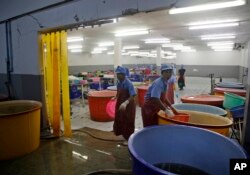The European Union is maintaining the threat of a seafood import ban on Thailand because the global exporter is still not doing enough to improve its fisheries and labor practices, officials said Thursday.
The 28-nation EU is keeping up the pressure because even some Thai legislation enacted last year to curb illegal practices was not sufficiently followed up by action over the past months, two EU officials with knowledge of the ongoing talks told the Associated Press.
Illegal, unreported and unregulated fishing is seen as a major contributor to dwindling fish stocks across the globe, while in Thailand it has also led to illegal labor practices amounting in some cases to slave labor.
"We continue to have serious concerns about the steps taken by the Thai authorities to fight illegal and unregulated fishing activities. This means that further action by the EU Commission cannot be ruled out," said one official, who asked not to be identified because of the sensitivity of the talks. Thai authorities insist they are working hard to fundamentally change the practices of the past.
Thailand, the third-largest global seafood exporter, with a stake of 8.1 percent of global exports, needs the wealthy European market to maintain its seafood prominence. Annual Thai fish exports to the EU are estimated to be worth between 575 million and 730 million euros ($650 million and $825 million).
Beyond illegal fishing though, Thailand also faces the slavery issue. The Associated Press has exposed during a two year investigation labor abuses amounting to slavery.
In addition to freeing more than 2,000 slaves, the reporting resulted in the arrest of a dozen alleged traffickers-so far eight have been convicted and sentenced-the seizing of millions of dollars' worth of seafood and vessels, several lawsuits, and legal actions by governments and corporations.
EU officials have said that the slavery and labor issues are intimately intertwined with the illegal fishing industry, and that a cleanup of the sector will automatically also have an impact on the labor situation.
The news that Thailand would continue to work under a so-called yellow card threat came Thursday as the EU Commission was assessing other nations from across the world whether they would be punished for unsustainable fishing that further weakens threatened fish stocks or whether reforms in some nations would result in lifting the threat of sanctions.
Thailand was given a yellow card exactly one year ago.
EU officials said that dialogue is still proving difficult.
"Lately we have been receiving less evidence of reform from them and more evidence from third countries and NGOs" of illegal practices or a lack of enforcement, the official said.
Both sides are to meet again next month in Brussels amid hope progress can be made.





